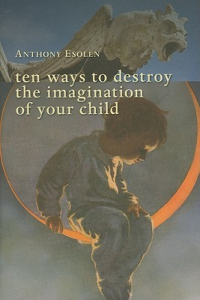Do you want to destroy the imagination of your child? Of course not! But would society want to destroy the creativity of its young citizens? According to Anthony Esolen, the answer is ‘yes’.
Esolen suggests that our society does not really like children and sees them as a resource to be managed. Assuming that, he explains why imagination would be bad, how our current practices are getting better at destroying it, and how we need to ‘improve’.
What are some of the things our society is doing to destroy the imaginations of the children?
- We do not teach them facts, and we do not drill them so that they master basic factual knowledge.
- We keep them busy with useless trivia. Charlotte Mason referred to this as twaddle, and it’s gotten much worse since her day.
- We keep them inside, and if they are allowed out we deny them the time and freedom to explore.
- We encourage them to think they can do things, but never allow them to realize that they are incapable of doing anything in real life. We’re raising good little consumers here!
- We deny them access to real things but encourage self-expression.
- We confuse archetypes and clichés.
- We reduce many things to politics, but no longer understand history or patriotism.
- We deride the past and the classics and do not honor our fathers. This was a deliberate goal of Dewey, the father of modern education.
- We practice multiculturalism, which leads us to destroy our own culture and patronize other ones.
- We sneer at heroism and things that are great and noble.
- We think love is about ‘making me happy’ rather than seeing beyond ourselves to others and even to the great mystery of love.
- We promote individualism in homogenous groups, so that everyone is the same little bit different.
- We no longer really value and understand friendship nor allow time for it.
- We fill our minds with mental and spiritual noise and have no peace or space to think.
- We think art is about self-expression rather than the expression of greater forces.
- We believe in materialism, not God.
How does that sound to you? If you read more in Esolen’s engaging style, full of references to all sorts of ideas, you won’t be disappointed. There’s a lot of insight in Ten Ways to Destroy the Imagination of Your Child, and a lot of fun as well.
It’s a bit complicated to read how to accomplish exactly the opposite of what many of us are trying to achieve. Esolen himself finds it difficult to keep up the pretence in his writing because he cannot help getting excited about the old ways when imagination was fostered naturally.
Now, Esolen is rather nostalgic for his own good old childhood, which he holds up as an example. He largely neglects topics such as the work children did in earlier ages, the agrarian lifestyle that so many were involved in, and how children were raised in different cultures. As a Canadian with childhood European roots, I find his focus on the mid-20th century US somewhat bemusing. But that’s a personal thing.
I’m also not quite convinced that ‘imagination’ is important enough to devote a whole book to, but really, this is a book about society’s view of children and child-raising and ‘imagination’ has been given a rather broad meaning.
Ten Ways to Destroy the Imagination of Your Child is inspiring on many levels. I myself am finding little things to tweak in our homeschooling life. My teens enjoyed the book, too. In fact, Mr. 17 based his decision to attend choir on it, and now he’s exploring the intricacies of four-part harmony.
Homeschoolers who need a pat on the back will find it in this book, especially if they prefer the classical or CM philosophy of education.
Note: I requested Ten Ways from an interlibrary loan program, and unfortunately it was due back too soon. Thus I’ve written this review from memory, without being able to reread parts of the book. That’s always a dangerous thing to do, but in this case the book is worth the risk.
This is yet another book in the in the 2012 52 Books in 52 Weeks Challenge, and is also linked to Saturday Reviews, The Better Mom, Encourage One Another Wednesday, Women Living Well Wednesdays, Works For Me Wednesday ,Raising Homemakers, and Favorite Resources this Week.
Disclosure I was not compensated for this review, and the opinions expressed are my own.


Wow! So much food for thought in just your bullet points alone. It sound like a great book! I’m going to pin this so I’ll remember to look into it further (hope that’s ok.)
No problem, Amy.
The more people see this, the better it will be for our children and our world. So thanks for pinning it. 🙂
I’ll have to see if my library has this book. I do hope that by homeschooling that we are a little ahead of the normal child in this area. At least our kids have time to foster their imaginations.
Yes, homeschooling makes a huge difference in so many ways!
I find this fascinating – our son goes to a school that uses the classic works as a basis for their curriculum, so it’s very different than traditional schools. I do love it. Thanks for sharing!
Yes, a classical school will definitely not stifle a child’s imagination like many traditional public schools do. I’m glad you found that option.
Sounds like an interesting read! Thanks for sharing at Favorite Resources.